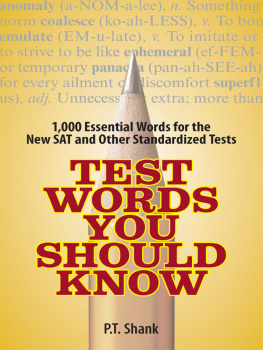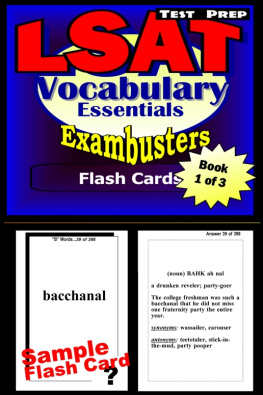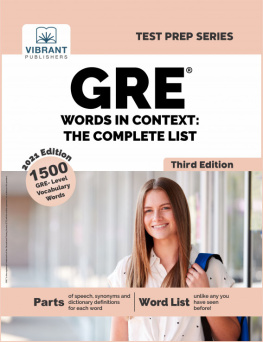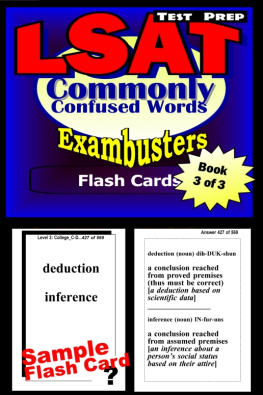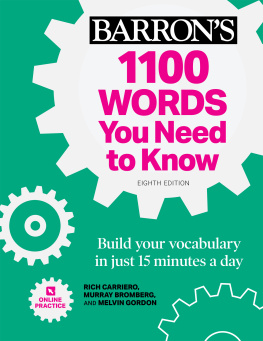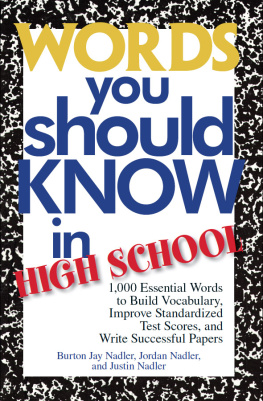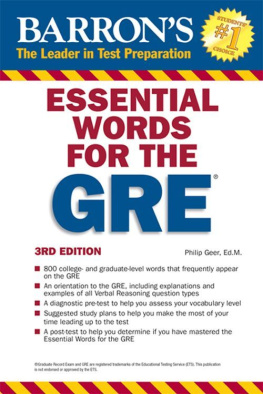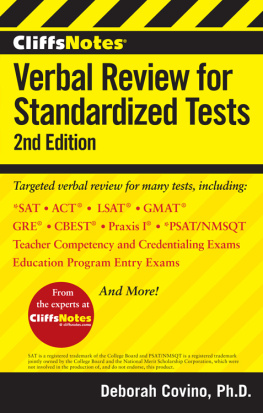TEST
WORDS
YOU
SHOULD
KNOW
1,000 Essential Words for the New SAT
and Other Standardized Tests
P.T. Shank

Copyright 2006, F+W Publications, Inc.
All rights reserved. This book, or parts thereof, may not be reproduced in any form without permission from the publisher; exceptions are made for brief excerpts used in published reviews.
Published by
Adams Media, an F+W Publications Company
57 Littlefield Street, Avon, MA 02322. U.S.A.
www.adamsmedia.com
ISBN 10:1-59337-521-2
ISBN 13: 978-1-59337-521-8
Printed in The United States of America.
J I H G F E D C B
Library of Congress Cataloging-in-Publication Data
Shank, P. T.
Test words you should know / P.T. Shank.
p. cm.
ISBN 1-59337-521-2
1. Vocabulary testsStudy guides. 2. SAT (Educational test)Study guides. I. Title.
PE1449.S457 2006
428.1--dc22
2006014704
This publication is designed to provide accurate and authoritative information with regard to the subject matter covered. It is sold with the understanding that the publisher is not engaged in rendering legal, accounting, or other professional advice. If legal advice or other expert assistance is required, the services of a competent professional person should be sought.
From a Declaration of Principles jointly adopted by a Committee of the American Bar Association and a Committee of Publishers and Associations
Many of the designations used by manufacturers and sellers to distinguish their product are claimed as trademarks. Where those designations appear in this book and Adams Media was aware of a trademark claim, the designations have been printed with initial capital letters.
This book is available at quantity discounts for bulk purchases.
For information, please call 1-800-289-0963.
Contents
Test Words You Should know
Dedication
To Christine Marie Merkel Nessel.
Because really, to whom else would I dedicate my first book?
Acknowledgments
Even I cannot find the words to truly thank the people who made this book happen. Shanna, the greatest editor ever; Don, without whom this book simply would not have been written; Mitchell and Ed for the use of their basement; Miss Phyl for keeping me fed and answering the phone; everyone who came up with a sentence or asked What does that mean? when a definition still wasn't clear enough; and finally C. Rex Mix and Betty Witt for instilling in me the love of words I carry with me to this dayI thank you.
Introduction
In this day and age, words are perhaps more important than ever before. We are no longer just communicating with our neighbors, friends, and coworkers. Today, with Internet, e-mail, and even global businesses, we are communicating with people from all over the country, all over the world. One thing hasn't changed, however. The words we choose to express ourselves continue to be the strongest representation of who we are as individuals. Being able to express ourselves articulately continues to be one of the best ways we can present ourselves as intelligent, well-educated people.
Okay. Great. But how will this book help you? If you are studying for the SAT or the GRE standardized tests, the answer is relatively obvious. Every word in this book has been identified as one that you might encounter in the verbal sections of one, if not both, of those tests. Even if you are not studying for a standardized test, these words will increase your vocabulary and assist you in presenting yourself well.
This is the fourth book in the excellent Words You Should Know series by Adams Media. It follows a similar pattern as its predecessors. There are five parts to this book. The body of the text includes over 1,000 words that have a strong possibility of appearing on a standardized test. These words are defined in easy-to-understand language that won't leave you more confused than when you started. A pronunciation guide that actually makes sense and a sentence using the word correctly accompanies each entry. Along with the words, within the main body of the text, you will find helpful hints about word usage, definitions, and common mistakes. At the end, we have also provided a list of the words themselves as an easy reference.
The second part of the book is an exercise section. Following the exercises is an appendix on word roots. These are helpful if you should run across a word on the test or in other reading that you don't know. Often, understanding its root and being able to break down the word is enough to allow you to understand the new word within the context of the sentence. After the roots, you will find three more appendices that offer more information not only on many of the 1,000 words in the book, but other words as well. Words that mean something other than what you expected. Words that are commonly misused. Even some words that are not actually words at all, in spite of their regular use in everyday conversations. This section offers some helpful hints to help you prepare for the SAT and GRE. Wondering what you'll do if you just don't know a word? Concerned about improving sentences or dealing with antonyms? Intimidated by the thought of a timed essay? Be sure to keep reading after the book is done. These are appendices you really don't want to skip or ignore.
So what makes this book different from the other Words You Should Know books? The words in this book range from those that are probably refreshers for high school students to words that a professional who's been out of school for over a decade might never have run across. Also, we have made a concerted effort to ensure there is very little overlap among the words in Test Words You Should Know and the three previous books in the series. Most of the words in this book you will not find in the other three, which makes it both a great standalone guide and a perfect companion piece if you already have one or more of the others. If you are in high school and want to increase your SAT scores or if you have been out of high school longer than you want to admit and simply want to learn a new word or two, I believe you will find words that challenge you and, hopefully, enjoy this book.
Yes, I said enjoy this book. Because words should be and can be fun. That's one of the hardest concepts for some people to grasp, and yet it is true. The more fun you can have with words, the easier it becomes to remember them and use them correctly. The goal of this book, as with its predecessors, is to help make wordseven words for a standardized testfun and easy to use. So, whether you are studying for a test or for yourself, may you come to enjoy the book and the words.
abbreviate (a-BREE-vee-ate), verb
To shorten or condense by omitting letters or words
These days, not many people realize R.S.V.P. was originally used to abbreviate the French phrase rpondez s'il vous plait, meaning please reply.
aberrant (aa-BER-ant), adjective
Unusual from accepted or expected norms; unexpected in light of past behaviors
The girl knew her brother wanted something because of his aberrant friendly behavior.
abet (AH-bet), verb
To assist or urge another person, usually to do something illegal; to help commit a crime
She was shocked to learn that by simply driving him to the airport, she had abetted in the commission of a crime.
What I Meant to Say Was
Often, words look and/or sound almost identical, especially if you are unfamiliar with them. Abet (AH-bet) and abut (uh-BUT) can easily be confused, especially when you are reading quickly. Abet means to aid someone in a criminal act, and abut means to border or be on the edge. Remember to read carefully to catch words like these!
Next page
